-
 Bitcoin
Bitcoin $118100
0.44% -
 Ethereum
Ethereum $3765
5.84% -
 XRP
XRP $3.498
3.12% -
 Tether USDt
Tether USDt $1.000
0.00% -
 BNB
BNB $753.2
3.41% -
 Solana
Solana $181.7
3.58% -
 USDC
USDC $0.9999
0.01% -
 Dogecoin
Dogecoin $0.2704
12.75% -
 Cardano
Cardano $0.8684
5.85% -
 TRON
TRON $0.3151
-0.86% -
 Hyperliquid
Hyperliquid $46.06
4.51% -
 Stellar
Stellar $0.4695
2.48% -
 Sui
Sui $3.910
3.18% -
 Chainlink
Chainlink $19.36
6.65% -
 Hedera
Hedera $0.2750
3.99% -
 Bitcoin Cash
Bitcoin Cash $544.6
6.31% -
 Avalanche
Avalanche $25.12
3.69% -
 Shiba Inu
Shiba Inu $0.00001559
5.40% -
 Litecoin
Litecoin $116.8
5.10% -
 UNUS SED LEO
UNUS SED LEO $8.991
0.05% -
 Toncoin
Toncoin $3.283
2.79% -
 Polkadot
Polkadot $4.509
3.97% -
 Uniswap
Uniswap $10.67
6.58% -
 Ethena USDe
Ethena USDe $1.001
-0.01% -
 Monero
Monero $323.2
0.48% -
 Pepe
Pepe $0.00001410
6.37% -
 Bitget Token
Bitget Token $4.964
1.93% -
 Dai
Dai $0.9998
-0.01% -
 Aave
Aave $326.2
3.85% -
 Bittensor
Bittensor $421.8
2.46%
What are the risks of investing in an an ETH ETF?
An ETH ETF offers exposure to Ethereum's price without owning crypto, but risks like regulatory changes, counterparty issues, and market volatility should be carefully considered before investing.
Jul 09, 2025 at 07:49 am
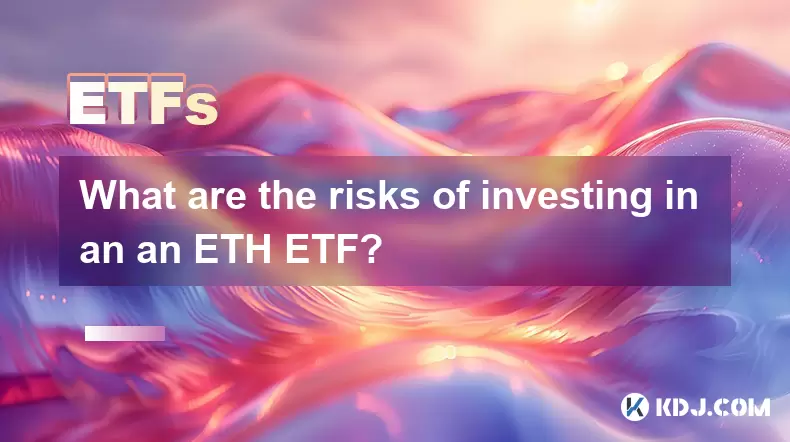
Understanding the Concept of an ETH ETF
An ETH ETF (Ethereum Exchange-Traded Fund) is a financial product designed to track the price of Ethereum without requiring investors to directly own or manage cryptocurrency. These funds are traded on traditional stock exchanges and offer exposure to Ethereum's price movements through regulated financial instruments. For many, especially institutional and retail investors unfamiliar with crypto wallets and exchanges, ETH ETFs provide a convenient way to gain exposure to digital assets.
However, while these products may seem like a safer entry point into the world of cryptocurrencies, they come with their own set of risks that need careful consideration before investing.
Regulatory Uncertainty
One of the most significant concerns surrounding ETH ETFs is the evolving regulatory landscape. Unlike traditional assets such as stocks or bonds, cryptocurrencies operate in a gray area when it comes to oversight by financial authorities. In many jurisdictions, including the United States, regulators have yet to fully define how crypto-based ETFs should be governed.
- The Securities and Exchange Commission (SEC) has historically been cautious about approving cryptocurrency ETFs.
- There is always a risk that regulatory bodies may impose restrictions or outright reject new applications.
- Changes in regulations can lead to sudden market volatility or even delisting of the ETF from major exchanges.
Counterparty Risk
Since ETH ETFs are typically issued by financial institutions, investors are exposed to counterparty risk — the possibility that the issuer may default or fail to meet its obligations. This is particularly relevant if the institution backing the ETF faces financial distress or insolvency.
- Investors do not hold actual ETH but instead rely on the fund’s custodial arrangements.
- If the custodian or issuing entity fails, there could be delays or losses in accessing the underlying value.
- Some ETFs may use derivatives or futures contracts, which introduce additional layers of complexity and risk.
Tracking Error and Pricing Discrepancies
While ETH ETFs aim to mirror the price of Ethereum, discrepancies can occur due to various factors. This phenomenon is known as tracking error, where the performance of the ETF diverges from the actual price of ETH.
- Market demand and supply dynamics for the ETF shares can cause premiums or discounts relative to the net asset value (NAV).
- Differences in settlement times between the crypto market and traditional stock exchanges may create arbitrage opportunities or pricing inefficiencies.
- High expense ratios or management fees can also erode returns over time.
Liquidity Concerns
Although ETFs are generally liquid instruments, this may not always be the case for newer or less popular ETH ETFs. Low trading volume can result in wider bid-ask spreads, making it harder to enter or exit positions at favorable prices.
- Smaller or niche ETH ETFs might struggle with liquidity during periods of high volatility.
- During market stress, some ETFs may experience difficulty in maintaining continuous two-way markets.
- Redemption mechanisms may not function smoothly if the underlying assets (e.g., ETH holdings) are difficult to liquidate quickly.
Security Risks and Custody Issues
Even though investors don’t directly hold Ethereum when investing in an ETH ETF, the fund itself must store the digital assets securely. Any compromise in the custody solution used by the ETF provider could expose investors to theft or loss.
- While reputable ETF providers often partner with established custodians, no system is completely immune to cyberattacks.
- Regulatory frameworks around crypto custody are still developing, and legal recourse in the event of a breach may be limited.
- Investors have no direct control over private keys or wallet addresses, increasing dependency on third-party security measures.
Market Volatility and Investor Behavior
Ethereum, like other cryptocurrencies, is known for its extreme price swings. An ETH ETF inherits this volatility, which can lead to rapid and unexpected losses.
- Emotional decision-making, such as panic selling during downturns, can amplify losses.
- Leverage-based or inverse ETH ETFs multiply the risks due to compounding effects over time.
- Retail investors may underestimate the risks associated with leveraged or complex structures embedded within certain ETF offerings.
Frequently Asked Questions
Q: Can I redeem shares of an ETH ETF for actual Ethereum?
A: No, in most cases, investors cannot redeem ETF shares for physical ETH. Redemption processes are typically reserved for authorized participants, such as large institutional investors.
Q: Are ETH ETFs available globally or only in specific regions?
A: Availability varies by jurisdiction. Some countries, like Canada and parts of Europe, have approved ETH ETFs, while others, including the U.S., are still evaluating regulatory frameworks.
Q: How do ETH ETFs differ from Ethereum futures ETFs?
A: ETH ETFs usually hold actual Ethereum or cash-settled derivatives, whereas Ethereum futures ETFs invest in futures contracts tied to ETH’s expected future price, introducing different risk profiles.
Q: What happens to my investment if the ETF issuer goes bankrupt?
A: Your investment could face delays or partial losses if the issuer becomes insolvent. However, the underlying assets may still be recoverable depending on legal protections and custodial agreements.
Disclaimer:info@kdj.com
The information provided is not trading advice. kdj.com does not assume any responsibility for any investments made based on the information provided in this article. Cryptocurrencies are highly volatile and it is highly recommended that you invest with caution after thorough research!
If you believe that the content used on this website infringes your copyright, please contact us immediately (info@kdj.com) and we will delete it promptly.
- Tezos, Conflux, and the Altcoin Rebound: What's Driving the Surge?
- 2025-07-21 14:50:12
- DeFi Evolution: Data Oracles and NFT Integration Leading the Charge
- 2025-07-21 14:30:12
- Super Apps, Stablecoins, and Future Payments: A NYC Perspective
- 2025-07-21 14:30:12
- Cardano (ADA) Price Surges Amid Bitcoin ATH Buzz: What's Next?
- 2025-07-21 12:30:11
- Bitcoin, UK, and Sale: Decoding the Crypto Buzz in Britain
- 2025-07-21 12:30:11
- Ethereum NFT Torch: Celebrating 10 Years of Innovation
- 2025-07-21 12:50:12
Related knowledge
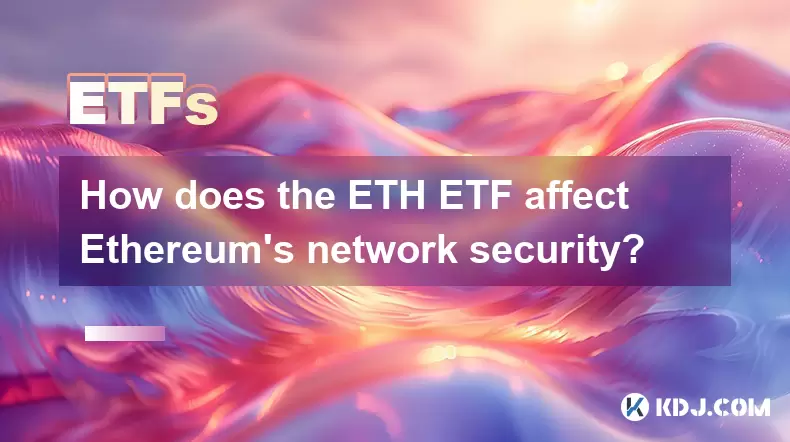
How does the ETH ETF affect Ethereum's network security?
Jul 17,2025 at 01:29pm
Understanding the ETH ETF ConceptAn Ethereum Exchange-Traded Fund (ETH ETF) is a financial product that allows investors to gain exposure to Ethereum ...
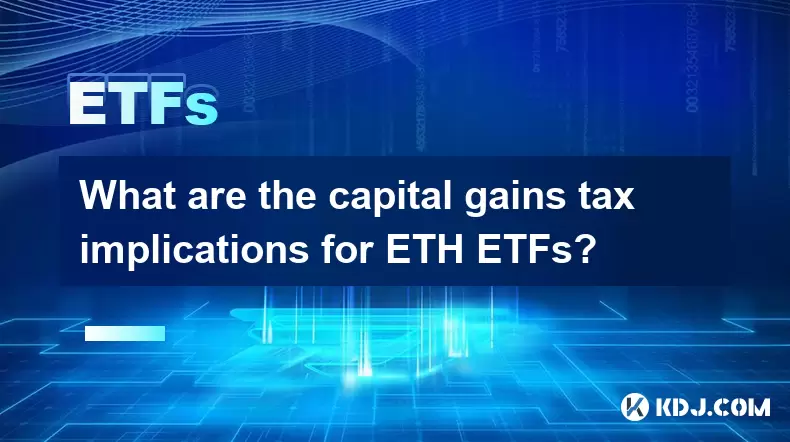
What are the capital gains tax implications for ETH ETFs?
Jul 18,2025 at 08:00am
Understanding Capital Gains Tax in Cryptocurrency InvestmentsCapital gains tax is a tax imposed on the profit realized from the sale of an asset that ...
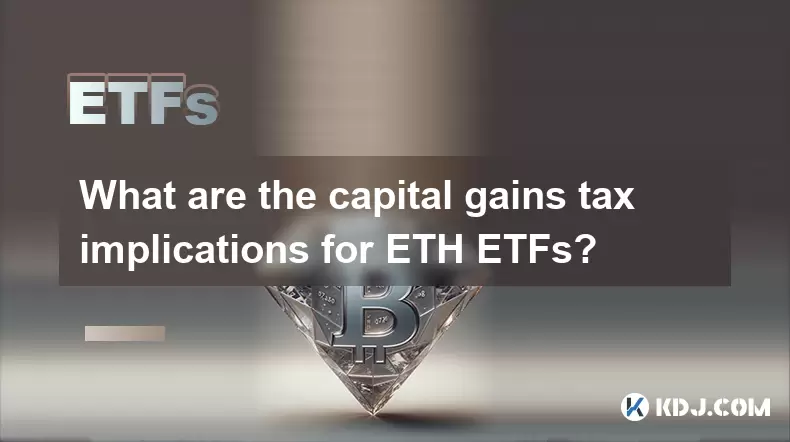
What are the capital gains tax implications for ETH ETFs?
Jul 21,2025 at 11:14am
Understanding ETH ETFs and Their TaxationAn Ethereum Exchange-Traded Fund (ETH ETF) allows investors to gain exposure to Ethereum without directly own...
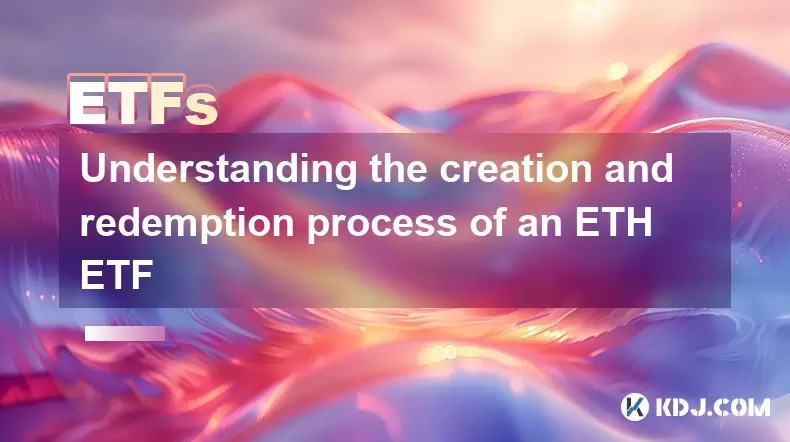
Understanding the creation and redemption process of an ETH ETF
Jul 19,2025 at 07:36am
What is an ETH ETF?An ETH ETF (Ethereum Exchange-Traded Fund) is a financial product designed to track the price of Ethereum without requiring investo...

How to analyze which ETH ETF is the best choice
Jul 19,2025 at 05:01pm
Understanding ETH ETFs and Their RelevanceEthereum Exchange-Traded Funds (ETFs) have emerged as a popular investment vehicle for those seeking exposur...

What are the liquidity risks for an ETH ETF?
Jul 21,2025 at 03:35am
Understanding Liquidity in the Context of ETH ETFsLiquidity refers to how easily an asset can be converted into cash without significantly affecting i...

How does the ETH ETF affect Ethereum's network security?
Jul 17,2025 at 01:29pm
Understanding the ETH ETF ConceptAn Ethereum Exchange-Traded Fund (ETH ETF) is a financial product that allows investors to gain exposure to Ethereum ...

What are the capital gains tax implications for ETH ETFs?
Jul 18,2025 at 08:00am
Understanding Capital Gains Tax in Cryptocurrency InvestmentsCapital gains tax is a tax imposed on the profit realized from the sale of an asset that ...

What are the capital gains tax implications for ETH ETFs?
Jul 21,2025 at 11:14am
Understanding ETH ETFs and Their TaxationAn Ethereum Exchange-Traded Fund (ETH ETF) allows investors to gain exposure to Ethereum without directly own...

Understanding the creation and redemption process of an ETH ETF
Jul 19,2025 at 07:36am
What is an ETH ETF?An ETH ETF (Ethereum Exchange-Traded Fund) is a financial product designed to track the price of Ethereum without requiring investo...

How to analyze which ETH ETF is the best choice
Jul 19,2025 at 05:01pm
Understanding ETH ETFs and Their RelevanceEthereum Exchange-Traded Funds (ETFs) have emerged as a popular investment vehicle for those seeking exposur...

What are the liquidity risks for an ETH ETF?
Jul 21,2025 at 03:35am
Understanding Liquidity in the Context of ETH ETFsLiquidity refers to how easily an asset can be converted into cash without significantly affecting i...
See all articles

























































































